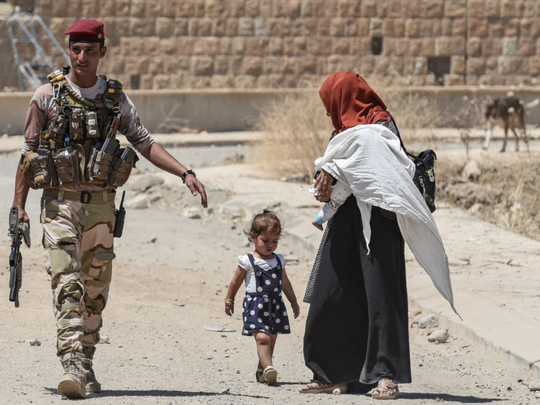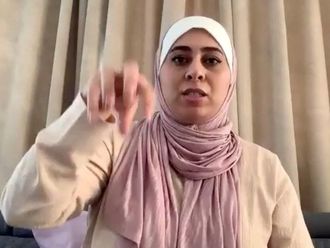
Baghdad: US-backed Iraqi troops pushed into the last Daesh stronghold in the country’s second largest city of Mosul on Sunday, an Iraqi commander said, formally launching the final major battle of an eight-month campaign.
The Daesh group captured Mosul when it swept across northern and central Iraq in the summer of 2014. Iraq launched a massive operation to retake the city last October, and has driven the militants from all but a handful of neighbourhoods. The extremists are expected to make their last stand in the Old City, a densely populated quarter with narrow, winding alleys.
Lt. Gen. Abdul Amir Rasheed Yar Allah, who commands army operations in Ninevah province, said Iraqi special forces, the regular army and Federal Police are taking part in the operation to retake the Old City, which began Sunday at dawn.
Iraq state TV aired live footage showing thick black smoke rising from the Old City and gunfire rattling from inside. It said leaflets were distributed urging civilians to leave through five “safe corridors.”
Gen. Abdul Ghani Al Assadi, the head of Iraq’s special forces, told state TV he expects the extremists to put up a “vicious and tough fight.”
The Old City is home to the centuries-old Al Nuri mosque, where Daesh leader Abu Bakr Al Baghdadi delivered a Friday sermon in 2014 as his group declared an Islamic caliphate in the areas it controlled in Syria and Iraq. The militants have lost much of that territory over the last three years, and Mosul is their last urban bastion in Iraq.
Up to 150,000 civilians are believed to be trapped in the Old City, where the militants are using them as human shields, UN humanitarian coordinator Lise Grande told The Associated Press on Friday. She said conditions are “desperate,” with little food and no clean water.
Three years after the Daesh group routed them in Mosul, Iraqi forces are now on the cusp of retaking the city from the militants and avenging a historic debacle.
The fall of Mosul was the worst defeat that Iraqi forces suffered in the war with IS, and regaining it would cap a major turnaround for security forces that broke and ran despite outnumbering the militants who attacked the second city in 2014.
“Of course, we celebrate the successes of the military” three years after the city’s fall, said Gen. Al Assadi.
“Three years ago, around this time, Daesh ... was moving rapidly towards Baghdad,” said Brett McGurk, the US envoy to the international coalition against Daesh. “Mosul fell, seven divisions of the Iraqi security forces simply disintegrated,” he said.
Iraqi forces “were not prepared for a threat like that” posed by Daesh in 2014, said coalition spokesman Colonel Ryan Dillon. Daesh “was knocking on the doors of Baghdad.”
At that time, recovery “looked almost impossible, and many were saying, ‘Well, this is the end of Iraq’,” McGurk said.
A combination of factors ultimately stopped the militants short of Baghdad, and they were not able to launch a large-scale conventional attack on the capital.
Grand Ayatollah Ali Al Sistani, the country’s top Shiite cleric, called for volunteers to battle Daesh, and Iran-backed Shiite militias already on the field fought under that banner to first halt the militants and then slowly push them back, while new volunteer units were also established.
The United States meanwhile launched an air campaign against Daesh in Iraq about two months after Mosul’s fall, which became an international coalition effort also involving training and other support for Iraqi forces.
The Iraqi security forces have since recaptured much of the territory seized by Daesh, including three cities, and have retaken most of Mosul, the fourth and largest.
In Mosul, “nothing remains for Daesh except three or four neighbourhoods in which it is surrounded,” Al Assadi said.
When Daesh seized Mosul, “the units that were present were in fact lacking some preparations and some equipment ... and therefore the fall (of the city) happened quickly,” he said.
“Now the units are well-prepared and their relationship with the citizen — and this is a very important point — is a good relationship and the citizen cooperates with the units,” Al Assadi said.
“Success in the Mosul operation will highlight how far the Iraqi Security Forces (ISF) have come since their collapse in June 2014,” said Patrick Martin, Iraq analyst at the Institute for the Study of War.
But Martin noted that “recapturing terrain in Mosul should not obscure the fact that the ISF remains incomplete and flawed,” including that “they still have insufficient manpower to clear and hold the country.”
Pushing the militants back has taken a massive toll on Iraq: years of battles have left thousands dead and hundreds of thousands displaced, and laid waste to swathes of the country, while many suffered under brutal militant rule.
“Nineveh province in general and Mosul specifically passed through a major tragedy,” said Staff Lieutenant-General Abdul Wahab Al Saadi, another senior Counter-Terrorism Service commander.
Civilians suffered through massacres and rapes, while a “very big price (was) paid by all the units” that fought, Al Saadi said.
The recapture of Mosul will also not mark the end of the war against Daesh in Iraq, as the militants will still control territory in Kirkuk province further south as well as in the west.
And then there is the “future threat”, Dillon said, that Daesh “will devolve back into an insurgency again.”











